| President Trump declared a national emergency last February to divert billions that had been appropriated for the military to fund construction of his wall along the southern border. White House lawyers told Trump he could reprogram that money without the declaration. But the president was determined to announce a national emergency, we reported at the time, for fear of looking weak if he didn't. Thirteen months later, Trump has appeared afraid of looking weak if he does declare a national emergency to respond to the outbreak of the novel coronavirus. He's resisted a growing chorus of pleas from local leaders, as well as congressional Democrats, to declare a national emergency. Under the 1988 Stafford Act, this would enable the Federal Emergency Management Agency to take disaster-level action and free up billions in assistance for states and municipalities on the front lines of the pandemic. Trump remained noncommittal when asked Thursday in the Oval Office whether he will declare a national emergency. "Well, we have things that I can do," he replied. "We have very strong emergency powers under the Stafford Act. … I have it memorized, practically, as to the powers in that act. And if I need to do something, I'll do it. I have the right to do a lot of things that people don't even know about." Trump added that he may invoke the Stafford Act "at some point" but suggested that things are not yet bad enough to do so. "It may be some of the more minor things at this point," he said. "But, you know, look, we're in great shape. Compared to other places, we are in really good shape, and we want to keep it that way. That's why I did the ban with respect to Europe." Trump's reluctance to claim executive power amid the gravest crisis of his presidency, when he's had a penchant for doing so in less dire circumstances, is one of the more puzzling elements of what has been his administration's muddled and confused response to the outbreak. There are now more than 1,600 confirmed cases of the coronavirus in the United States and at least 41 deaths. The Dow plummeted 10 percent on Thursday, posting its largest one-day point loss in history. In percentage terms, it was the worst day for the markets since Black Monday in October 1987, despite the Federal Reserve – which Trump doesn't control – announcing it would pump $1.5 trillion into the short-term lending markets. 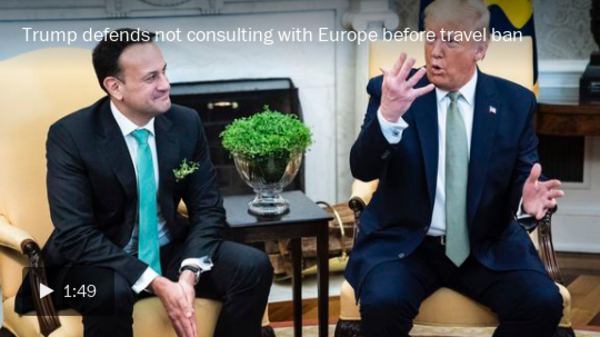 | | | This has made for a surreal reversal of roles. Sen. Bernie Sanders (I-Vt.) used the word "emergency" 10 times during a 16-minute speech about the coronavirus. "We are dealing with a national emergency, and the president should declare one now," said Sanders, who helped champion the unsuccessful effort in the Senate last year to overturn Trump's border-wall emergency. "The number of casualties may actually be even higher than what the Armed Forces experienced in World War II." Three dozen Senate Democrats signed an open letter urging Trump to invoke the Stafford Act and declare a national disaster. "Why he hasn't done it is a mystery," Minority Leader Chuck Schumer (D-N.Y.) said in a speech on the Senate floor. "We need him to do it and do it now." Part of Trump's hesitation to declare a national emergency has seemed to be about saving face. Just last week, for example, he said it would be unnecessary. "I don't think you'll need that because I really think we're in extremely good shape," he said. Declaring an emergency after making comments like that would put in stark relief the flat-footed nature of his initial reaction. "Health and Human Services Secretary Alex Azar is pushing for the designation. But Vice President Mike Pence, who Trump tapped to lead the administration's coronavirus response, is wary it could trigger an economic tailspin," Politico's Anita Kumar reported on Wednesday. "There's no deadline for a decision, but one of the people familiar with the talks said Trump's aides will not give the president a final verdict until Jared Kushner, the president's senior adviser and son-in-law, talks to relevant parties and presents his findings to the president." The story quotes an unnamed "Republican who speaks to Trump" saying: "The president isn't persuaded because [an emergency declaration] contradicts his message that this is the flu." CNN reported Thursday that Trump has decided he's willing to invoke the Stafford Act, but the declaration is going through legal review at the White House "as officials navigate how broad it can be." There are consequences to the delay. The FEMA Disaster Relief Fund has $42.6 billion. Trump declaring a national emergency would give the administration access to that pool of money to help manage the fallout from the spread of the virus, including setting up mobile hospitals and transporting the infected. Perhaps more importantly, it would open a gusher of money to states, counties and cities that may soon be overwhelmed by a surge in cases. An emergency declaration means that the federal government picks up 75 percent of the cost of eligible protective measures so long as the state picks up the other 25 percent. The New York Times's editorial page, in urging Trump to declare a national emergency, acknowledges the irony: "This editorial board is not inclined to grant the president more executive power, given his track record. But this crisis demands such quick action in the interests of the American people that we can only hope he will set his more selfish impulses aside and rise to the moment." 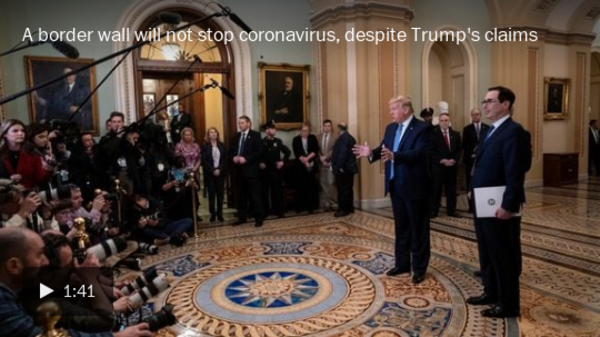 | | | The internal debate about whether to declare an emergency highlights Kushner's growing role in the White House's response to the coronavirus. "Even Trump — a man practically allergic to admitting mistakes — knew he'd screwed up by declaring Wednesday night that his ban on travel from Europe would include cargo and trade, and acknowledged as much to aides in the Oval Office as soon as he'd finished speaking," Philip Rucker, Ashley Parker and Josh Dawsey report. Kushner "reassured Trump that aides would correct his misstatement, four administration officials said, and they scrambled to do just that. … Trump — who believed that by giving the speech he would appear in command and that his remarks would reassure financial markets and the country — was in 'an unusually foul mood' and sounded at times 'apoplectic' on Thursday as he watched stocks tumble and digested widespread criticism of his speech … "The speech was largely written by Kushner and senior policy adviser Stephen Miller, who were still making tweaks to the text until moments before Trump delivered it … Thirty minutes before Trump appeared live on camera, a final draft of his remarks still had not circulated widely within the White House … And senior health experts in the administration did not review a final draft of the remarks, according to a senior administration official. … 'Everyone usually gets [Trump] where he needs to be within a couple of days,' one official said. 'The problem is we don't have a couple of days.'" "This was the most expensive speech in history," Luca Paolini, chief strategist at Pictet Asset Management, told the Financial Times after the markets tanked because Trump's Oval Office address make investors more jittery. "Investors are voting with their feet, and I can't blame them." "After feeling besieged by enemies for three years, Mr. Trump and some of his advisers view so many issues through the lens of political warfare — assuming that criticism is all about point scoring — that it has become hard to see what is real and what is not," Peter Baker and Maggie Haberman report in the New York Times. "Even when others with Mr. Trump's best interests at heart disagree, they find it hard to penetrate what they see as the bubble around him. Thomas P. Bossert, a former homeland security adviser to Mr. Trump, has tried repeatedly in recent days to be patched through to the president or [Pence] to warn them just how dire the coronavirus pandemic really is, only to be blocked by White House officials … Among the advisers who share the president's more jaundiced view is [Kushner], who considers the problem more about public psychology than a health reality, according to people who have spoken with him." | | | More on the federal response The Trump administration announced a series of steps to speed up testing."The Food and Drug Administration has created a 24-hour emergency hotline for laboratories having difficulty getting materials or finding other impediments to running tests," Amy Goldstein reports. "Officials also announced they were giving nearly $1.3 million in federal money to two companies trying to develop rapid covid-19 tests that could determine whether a person tests positive within an hour. In addition, the Department of Health and Human Services assigned Brett Giroir, the assistant secretary for health, to coordinate all covid-19 testing efforts among federal public health agencies, including the FDA, the Centers for Disease Control and Prevention, state and local health departments, and public and private clinical laboratories. The FDA also is giving New York state the ability to authorize certain public and private labs to test for the virus under the aegis of the state health department, without first getting federal approval. Earlier this week, New York Gov. Andrew M. Cuomo (D) announced he was moving ahead to contract with 28 private labs in New York." "Since mid-January, the [CDC] and other public health laboratories have tested about 11,000 specimens for the disease. The number of people who have been tested is likely far lower than that tally, however, because labs usually test at least two specimens per person, experts said. In contrast, South Korea has been running 10,000 tests per day," Shawn Boburg, Emma Brown, Derek Hawkins and Goldstein report. "The number of medical professionals and patients who are denied access to tests is not tracked nationally. But in interviews, people from states as varied as Wisconsin, North Carolina, Washington, Indiana and New York said their doctors sought but were unable to get testing approval from local or state health officials." The administration and Democrats appear close to a deal on an economic relief package. "Speaker Nancy Pelosi (D-Calif.) said she expected a vote Friday 'one way or another' to approve the package, which is expected to amount to several tens of billions of dollars," Mike DeBonis, Erica Werner and Jeff Stein report. "The legislation will include measures to boost paid family leave and unemployment insurance, ensure free coronavirus testing, and strengthen nutritional aid like food stamps. The emerging agreement builds upon a bill House Democrats released late Wednesday that included a number of provisions Republicans opposed, setting off hours of frenzied negotiations on Capitol Hill to reach bipartisan consensus. Lawmakers of both parties were determined to deliver an economic relief package before a congressional recess that had been scheduled for next week. … "A final hang-up was over a paid family and medical leave provision, with Republicans pushing to structure it in a way that it could be implemented quickly and avoid undue burdens on employers. … While House approval of the package was expected on Friday, clearing lawmakers to begin a scheduled recess, the Senate is not expected to take it up until next week. Majority Leader Mitch McConnell (R-Ky.) canceled his chamber's planned recess next week but allowed senators to leave Washington for the weekend. … Increasing numbers of lawmakers are announcing plans to shut down their offices and self-quarantine following brushes with infected individuals." Experts give Trump bad marks. "One federal official involved in the [ban on travel from Europe] said [it] was too late and should have been done at the end of February, when cases began surging in Italy," David Nakamura, Lena Sun and William Wan report. "That also seemed true in the case of the White House's other big remedy this week, a proposed payroll-tax cut that the president boasted would offer the public 'substantial relief' … Some economists have said its impact in stemming losses for ordinary workers amid the coronavirus scare would be applied unevenly and be less effectual than other options." The American response has been "much, much worse than almost any other country that's been affected," said Ashish Jha, who runs the Harvard Global Health Institute. He told NPR that the American response has been a "fiasco" and "mind-blowing": "I still don't understand why we don't have extensive testing." The pandemic is testing the cruise industry's long-standing ties to Trump."The State Department and the [CDC] warned U.S. citizens, particularly those with medical issues, not to travel by cruise ship, sending the industry into a panic," Dawsey, Jonathan O'Connell, Ashley Parker and Beth Reinhard report. "The administration's whipsawing posture has led to an intensive behind-the-scenes lobbying effort by cruise executives to mitigate the financial fallout from the virus … The coming days will test the clout of the industry, which has long-standing connections to Trump … At [a] donor event Friday, the president brought up the industry and said he did not want it to shut it down or for it to suffer job losses … But at the same time, several top health officials and members of the administration's coronavirus task force have been pushing for a tougher stance and wanted to impose a temporary ban on Americans going on cruise ships." | | | Tracking the domestic fallout  | - Many older Americans are downplaying the threat, determined to move forward with travel plans despite warnings from public health officials. (Darryl Fears and Brady Dennis)
- The Ohio Department of Health believes as many as 100,000 Ohioans are already carrying the coronavirus. Gov. Mike DeWine (R) expects the cases to double every six days. (News5 Cleveland)
- California Gov. Gavin Newsom (D) issued an order allowing the state to take over hotels for coronavirus patients. (Los Angeles Times)
- Michigan, New Mexico, Maryland, Ohio and Oregon will close all schools statewide. (Teo Armus)
- Maryland also banned gatherings of over 250 people, the most aggressive steps yet in the D.C. region. Virginia declared a state of emergency and closed the Arlington National Cemetery, with strict rules in place for funerals. (Darran Simon, Erin Cox and Laura Vozzella)
- The March Madness basketball tournaments were canceled for the first time in 82 years. The NCAA also canceled all other winter and spring championships. (Chuck Culpepper and Ava Wallace)
- Major League Baseball delayed Opening Day by at least two weeks and cancelled the remainder of spring training. (Dave Sheinin)
- Disney World and Universal Orlando closed theme parks for the rest of March. So did Disneyland in California. (Orlando Sentinel)
- The wave of cancellations across the tourism industry hit Trump's hotels and clubs. (Joshua Partlow, David Fahrenthold and Jonathan O'Connell)
- Inside New Rochelle, New York's "containment zone," some residents act like little is amiss. Some are even openly defying government suggestions to limit their socializing, highlighting the challenge communities nationwide could encounter if they, too, become containment zones. (Tim Craig)
- The virus has spread to nearly a dozen long-term care facilities in Seattle. (Jay Greene and Maria Sacchetti)
- D.C. is closing all the Smithsonian museums, plus the National Zoo, and canceling National Cherry Blossom Festival events. (Fritz Hahn)
- Coronavirus could pose a serious concern in ICE jails and immigration courts. ICE officials said that, as of March 3, four detainees had met the criteria for coronavirus testing, but none tested positive. (Abigail Hauslohner, Nick Miroff and Matt Zapotosky)
- New York City's largest Chinese restaurant closed because the virus hurt business. (New York Post)
- A JetBlue passenger learned he had the virus while on a flight. He didn't tell anyone. The flight crew only found out after he was overheard talking about it. (NYT)
- A dozen firefighters in Maryland self-quarantined after being potentially exposed to the virus. (Peter Hermann and Paul Duggan)
- Muslim leaders are struggling to decide whether or when to close their mosques. (Sarah Pulliam Bailey)
- The virus has prompted Hollywood to postpone the release of several much-anticipated movies. (Steven Zeitchik)
- The Kennedy Center canceled all performances and events through the end of the month. (Peggy McGlone)
| | | The global sweep  Satellite imagery from Iran shows two massive burial pits. Excavation continues. (Maxar Technologies) | - Iranian authorities began digging a pair of trenches to bury coronavirus victims just two days after the government disclosed the outbreak. The burial pits are so vast, the size of a football field, that they're visible from space. (Erin Cunningham and Dalton Bennett)
- The White House ban on most travel from Europe begins today. Britain is exempted. (Lori Aratani, Josh Dawsey and William Wan)
- The virus has shut down Mount Everest. Nepal has canceled all permits to summit the world's tallest mountain, following China's lead. (Joanna Slater and Ankit Adkhikari)
- Hackers are seizing on coronavirus fears to steal data, researchers and regulators warn. (Craig Timberg and Tony Romm)
- Sophie Grégoire Trudeau, the wife of Canadian Prime Minister Justin Trudeau, tested positive for the virus. (Emily Rauhala)
- An American who tested positive, then negative, is stranded in Egypt. (Meryl Kornfield)
- Peter Dutton, an Australian official who recently met Attorney General Bill Barr and Ivanka Trump, tested positive. (Armus and Devlin Barrett)
- Trump said there are still "lots of options" for the Tokyo Olympics after a call with the Japanese Prime Minister. Earlier in the day, he suggested the Games might need to be postponed "for a year." (Simon Denyer)
Hospitals in Italy are running out of beds. "Nearly every day in the northern Italian region of Lombardy, more people arrive at hospitals than the day before — and all with the same virus. Some arrive barely able to breathe. Some are redirected to facilities farther away because space and resources are scarce and growing scarcer. And within a few days, doctors and health experts say, even those hospitals will be filled up. The region at the center of Italy's coronavirus outbreak, they say, is on the verge of running out of room for its most critical patients. Based on recent projections, Antonio Pesenti said, that moment is imminent," Chico Harlan and Stefano Pitrelli report. "Lombardy, home to Italy's financial hub of Milan, boasts a health-care system as proficient as any in Western Europe. Its facilities have clung on through three weeks of galloping case growth by delaying surgeries, stopping HIV treatments, converting regular hospital space into covid-19 units, and depending on exhausted doctors and nurses — some of whom are becoming sick themselves. But it can't keep up for much longer, with cascading implications for Italy's ability to combat the virus. Already, the region has 4,200 coronavirus patients in need of hospitalization; Pesenti projected that over the next two weeks, that number could grow nearly fivefold, to 20,000. As many as 3,000 or 4,000 of them would require intensive care. Lombardy has just 737 intensive-care beds available for coronavirus patients. More than 600 are filled."  | "Some of the world's top experts tracking the spread of the coronavirus predict that in a matter of weeks, much of Europe could be facing a similar surge in cases that has locked down Italy," Loveday Morris and William Booth report. "The mathematical models developed by epidemiologists to track the virus show a sharp trajectory of infections in Spain, Germany, France and Britain. The modelers in Europe say a similar arc is likely in the United States, but anticipating the spread is made more difficult by the lack of widespread testing … 'Italy is about two weeks ahead of Britain and the rest of Europe,' said Francois Balloux, director of the Genetics Institute at University College London. Observations by epidemiologists show that if unchecked, the number of infections double approximately every five days, with infected individuals, on average, capable of passing the virus on to an average of about 2.5 people. 'What we are seeing is not rocket science,' Balloux said. 'You have two cases, then four, then eight, then 16.'" Seema Verma, a top Trump health official, refused four times on Fox News last night to give a direct answer as to whether U.S. hospitals are equipped to deal with the coming influx of patients. (Fred Barbash) | | | Quote of the day "I was careless and have no excuse," said Utah Jazz center Rudy Gobert, the first NBA player diagnosed with the coronavirus. He jokingly touched all the microphones on the table in front of him as he left a news conference before he tested positive. (Cindy Boren and Des Bieler) | | | 2020 watch Joe Biden appointed Jen O'Malley Dillon as his new campaign manager. "The move is intended to quell concerns raised in recent weeks by senior Democratic strategists about the leadership structure of the Biden campaign, which has been beset by underwhelming fundraising, scant staffing resources and organizational miscues during the early nominating contests," Michael Scherer reports. "The campaign shuffle is an acknowledgment that while Biden has had a remarkable recent run of victories … his operation was not up to the challenge posed by President Trump if Biden were to win the nomination. After Biden performed well below expectations in the Iowa caucuses, Anita Dunn, a senior adviser who previously worked for [Obama], took operational control of the campaign, sharing responsibilities with Biden's original campaign manager, Greg Schultz. Dunn, who helped Biden prepare for a possible 2016 run for president, will also continue with the campaign, returning to her role as a senior adviser to Biden. Schultz, who prepared and built the Biden campaign and oversaw initial hiring and delegate strategy, will stay on in a new role." Biden and Sanders both tried to project presidential stature with speeches on the outbreak."Biden outlined how the Pentagon could build new hospital beds, how researchers could strive for a vaccine, and how testing kits should be free and readily available," Matt Viser and Jenna Johnson report. "Biden's headquarters and field offices will be closed to the public, making door-knocking and grass-roots organizing that much harder, with four more states voting on Tuesday. … Biden opened his remarks by addressing the anxiety and worries spreading through the nation and offering comfort to those who have been infected or lost a loved one to the virus. He spoke for twice as long as Trump and repeatedly criticized the president for spreading misinformation, downplaying the threat and blaming foreign nations. He noted that Trump's administration has reduced public health funding, cut federal agencies and strained relationships with other countries. … The Democratic National Committee announced that it was moving Sunday night's Biden-Sanders debate from Phoenix to Washington so the candidates and their staffs would not have to travel as far. There will be no live audience and one of the moderators, Univision's Jorge Ramos, is dropping out because he recently came into proximity with someone who tested positive for the coronavirus." Democrats are urging party leaders to weigh alternatives for the national convention. "In Wisconsin, where Gov. Tony Evers on Thursday declared a health emergency over the coronavirus pandemic, Andrew Werthmann, a member of the Democratic National Committee, said he intended to raise questions about the need for contingencies," Isaac Stanley-Becker and Michael Scherer report. "Concern deepened as state parties took it upon themselves to alter their procedures in compliance with health guidelines. … Thousands of delegates, activists and others in the party faithful are expected to cram into the Fiserv Forum in Milwaukee for the July event. But the quest to showcase the nominee they hope will oust President Trump could run counter to the advice of public health experts, who are advising against large gatherings, if the coronavirus outbreak remains severe in the summer. 'We are having a convention,' said Xochitl Hinojosa, a spokeswoman for the Democratic National Committee. 'There are no talks about a virtual convention right now.'" The pandemic may slow down delegate elections for the convention. State party leaders are wrestling with whether to postpone the selection process – or to hold them online or via telephone. (Wall Street Journal) The AP finally called California's primary for Sanders. "California has 415 delegates, the greatest number of all Super Tuesday states. The final delegate allotment is still being determined," Felicia Sonmez and David Weigel report. "According to exit polling in California, Sanders led Biden among white voters by six points; among Asian voters by 12 points; and among Latino voters by 27 points. He trailed among only black voters, but not by the landslide margins he lost them by in Super Tuesday's Southern primaries." Left-wing groups supporting Sanders are intensifying their efforts, even as Biden surges. "The sprawling network of socialists, climate-change activists, millennial organizers and other liberal advocates, who raise money from millions of members and have knocked on many doors in support of Sanders, say they plan to cite the coronavirus outbreak and the uncertain economy to advance him as the only candidate who can enact broad economic and environmental change," Michelle Ye Hee Lee and Anu Narayanswamy report. "Some activists are less optimistic. At least one group, the Center for Popular Democracy, said that it will remain supportive of Sanders's campaign message but that it is shifting national messaging to be more focused on progressive values because it is 'realistic about the challenges in the road ahead.'" | | | Other developments that shouldn't be overlooked 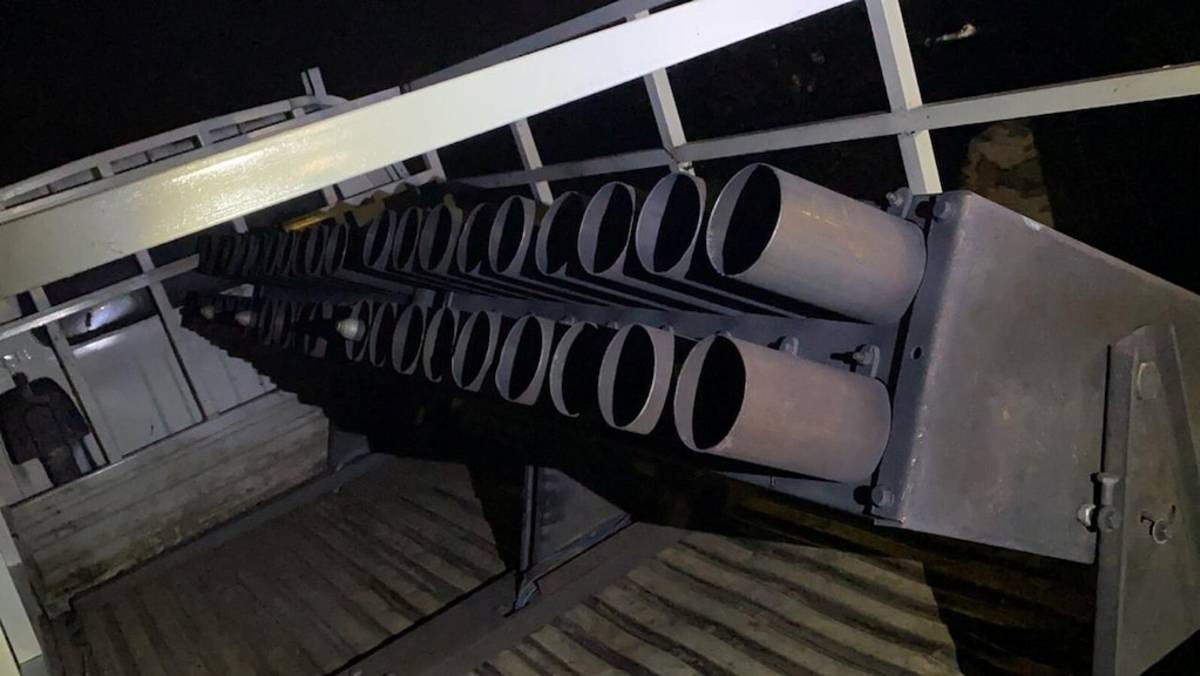 A truck loaded with Katyusha rockets is seen on the outskirts of Baghdad. (Iraqi Media Security Cell/Reuters) | The U.S. launched strikes in Iraq against an Iranian-backed militia.The airstrikes were a response to a rocket attack on a military base that killed one British and two U.S. service members in a new round of escalating tensions. "The Pentagon said in a statement that U.S. forces hit facilities 'across Iraq' linked to Kataib Hezbollah, including storage facilities that housed weapons used in attacks on American and coalition troops. 'The United States will not tolerate attacks against our people, our interests, or our allies,' Defense Secretary Mark T. Esper said in the statement. 'As we have demonstrated in recent months, we will take any action necessary to protect our forces in Iraq and the region.' The aerial bombardment took place around 1:30 a.m., according to the Iraqi military. It was unclear whether any militia members were killed," Dan Lamothe and Louisa Loveluck report. "In response to a request for a White House statement, a senior administration official said that Trump had directed U.S. forces to conduct strikes on five Kataib Hezbollah weapons storage facilities 'to significantly degrade the group's ability to carry out future attacks.'" A pregnant woman died after falling from the border wall. "A pregnant 19-year-old's fatal fall while trying to climb over a border fence outside Clint, Tex., on Saturday is the latest in a string of recent accidents and injuries that reflect migrants' increasingly desperate attempts to enter the United States," Nick Miroff reports. "The woman, Miriam Estefany Girón Luna, of Guatemala, fell backward from the top of an 18-foot-high span of steel mesh fencing while trying to cross with the child's father … Girón Luna, who was 30 weeks pregnant, died from her injuries Tuesday, and doctors were not able to save the child … Tekandi Paniagua, a Guatemalan consular official based in Texas, said the fact that the couple was attempting to sneak into the United States by climbing the fence was an indication of shifting migration dynamics at the border. A year ago, during the height of the family migration surge, the couple probably would have tried to turn themselves in to seek asylum, he said. But an array of new restrictions imposed by the Trump administration is driving border-crossers to take more risks, migrant advocates say." Chelsea Manning was released from jail. Manning was released "after a federal judge announced that the grand jury investigating WikiLeaks founder Julian Assange had been disbanded,'" Rachel Weiner reports. "'Ms. Manning's appearance before the grand jury is no longer needed,' federal judge Anthony J. Trenga of the Eastern District of Virginia wrote. 'Her detention no longer serves any coercive purpose.' Manning had been detained in the Alexandria Detention Center for 11 months in civil contempt for her refusal to testify. The judge's order comes a day after the former Army private attempted suicide in jail. Authorities said they stepped in before serious harm occurred." | | | Social media speed read | An aide to Brazilian President Jair Bolsonaro tested positive for the virus days after posing for this photo with Trump and Pence. Despite this news, Trump said he still does not plan to get to tested for the virus: | 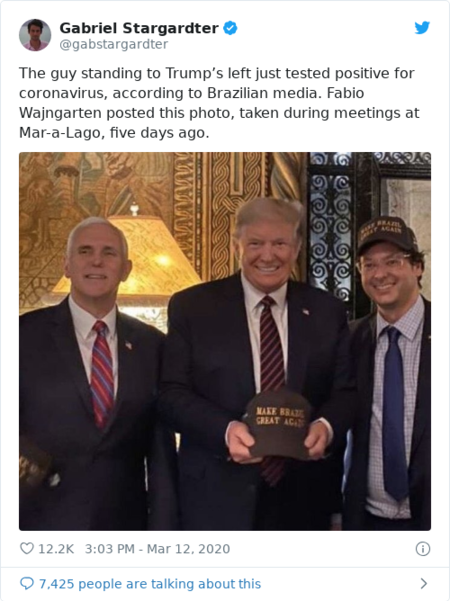 | | | | Rep. Katie Porter (D-Calif.) got the CDC director to commit during an overnight hearing to use existing legal authority to make coronavirus testing free: | 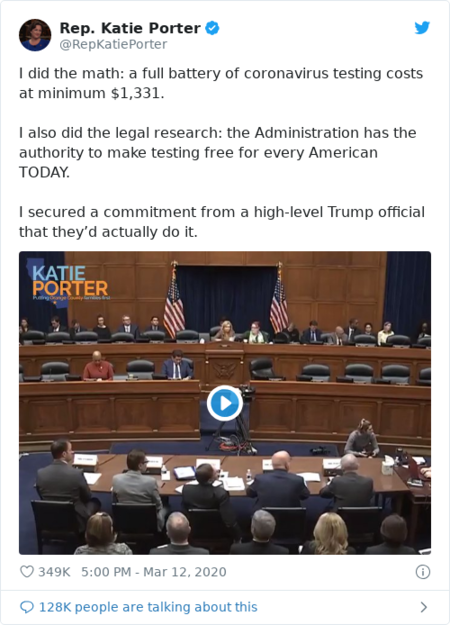 | | | | Hillary Clinton told Trump what he should do: | 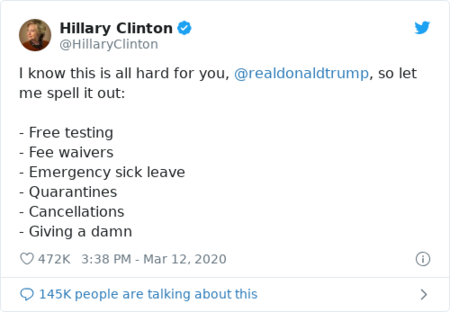 | | | | Actor Tom Hanks shared an update a day after he and wife Rita Wilson were diagnosed with the coronavirus in Australia: | 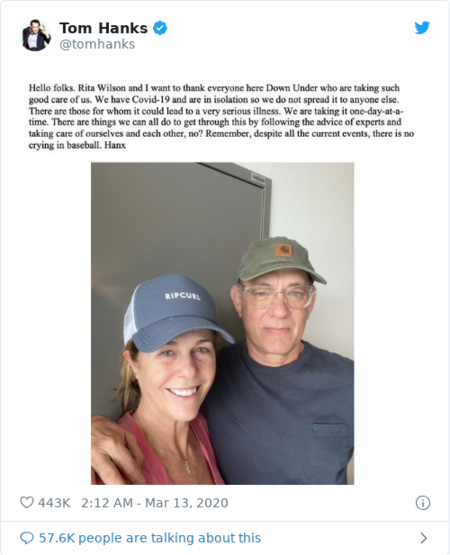 | | | | A D.C. hospital is redirecting anyone with symptoms to this tent: | 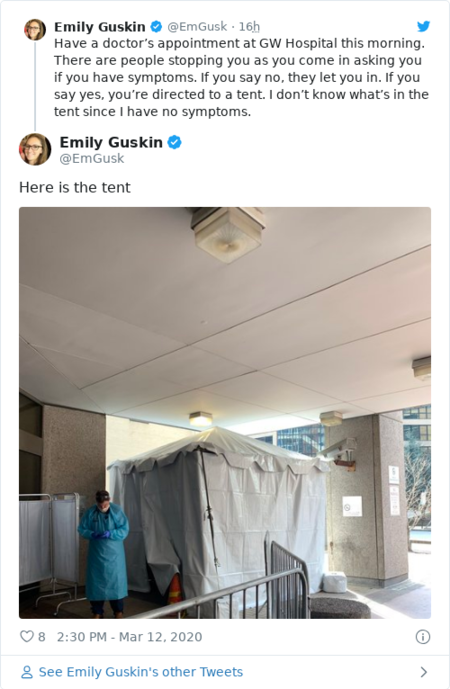 | | | | The New York Post said goodbye to sports for now: | 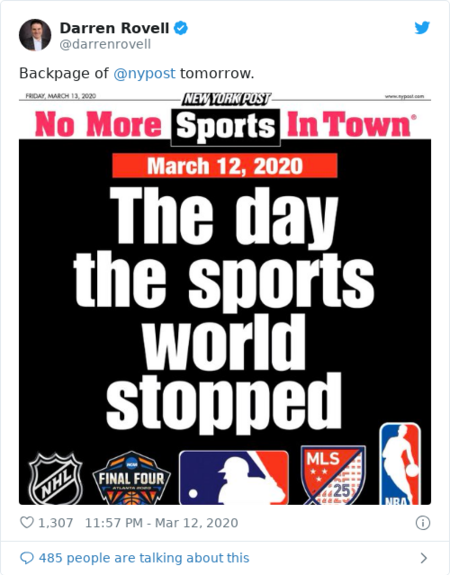 | | | | | | Videos of the day | Stephen Colbert had his first-ever no-audience show after all late-night shows were ordered to tape without audiences: |  | | | | Seth Meyers delivered his "A Closer Look" monologue despite having canceled last night's show: 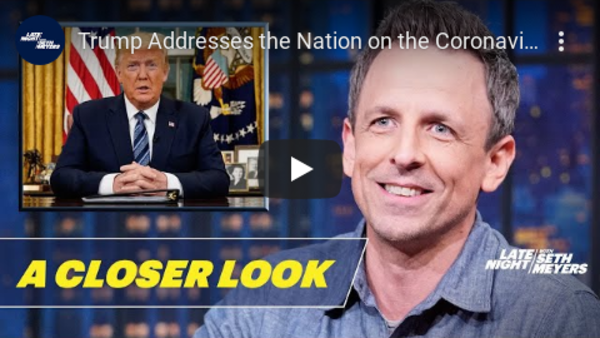 | | | | A recently unemployed Pete Buttigieg guest hosted "Jimmy Kimmel Live," which, like other shows, had no audience:  | | | | | | |
No comments:
Post a Comment